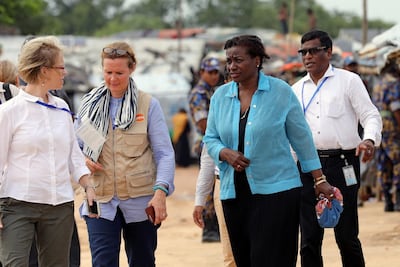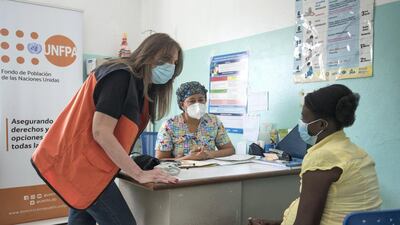A UN agency launched a scathing attack on Britain over its foreign aid budget cuts, warning that women and girls around the world will suffer as a result.
The UN Population Fund said the UK planned to cut family planning aid from £154 million ($214m) to £23m this year – a drop of 85 per cent.
Details of the cut emerged came after other programmes were identified as being in the firing line for funding cuts after Britain slashed its foreign aid budget.
The agency, UNFPA, supplies contraceptives and maternal health medicine for millions of women in some of the world’s poorest countries, trains maternal health workers, and promotes efforts to stop female genital mutilation and child marriage.
Natalia Kanem, UNFPA executive director, accused Britain of “stepping away from its commitments at a time when inequalities are deepening and international solidarity is needed more than ever”.
“These cuts will be devastating for women and girls and their families across the world,” she said.
"With the now-withdrawn £130m, the UNFPA Supplies Partnership would have helped prevent around 250,000 maternal and child deaths, 14.6 million unintended pregnancies and 4.3 million unsafe abortions.”
An additional £12m will be cut from UNFPA's core operating funds.
The agency acknowledged "the challenging situation facing many donor governments", but said it "deeply regrets the decision of our longstanding partner".
"The truth is that when funding stops, women and girls suffer, especially the poor, those living in remote, underserved communities and those living through humanitarian crises," it said.
The UK this year announced it would slash its overall foreign aid budget from 0.7 per cent to 0.5 per cent of its national income, a reduction of about £4 billion.
The programmes affected by the decision are now becoming apparent.
On Wednesday, it was reported the UK planned to slash funding for international clean water and sanitation projects by 80 per cent.
On Tuesday, Liz Sugg – a former Foreign Office minister who resigned in protest over the cuts – challenged the government to confirm which programmes would be cut.
She said the government planned to cut the overseas budget for girls' education by more than 40 per cent.

The former minister also claimed that Britain planned to close its Women’s Integrated Sexual Health programme and cut funding to the Reproductive Health Supplies Coalition by up to 80 per cent.
Foreign Secretary Dominic Raab said he did not recognise the figures, but admitted no area was immune to cuts.
Responding to the UN statement on Thursday, Ms Sugg said Britain’s withdrawn financial support to the women’s health organisation was a “double hit on the world's poorest”.
"The cuts which we're seeing to the aid budget are huge," she told the BBC Radio 4 Today programme on Thursday.
“This is money the UK committed to in the UN chamber, signed an agreement and now we’re walking away from it – it’s pretty unheard of.”
She said the UK was traditionally a strong advocate for women and girls around the world.
"(The cut) means millions of women will not have access to contraception and sadly that will mean many unwanted pregnancies and unsafe abortions," she said.
Former UK prime minister Tony Blair called on the leaders of the wealthy G7 collective of wealthy nations to redirect aid budgets to help poorer nations purchase Covid-19 vaccines.
Vaccines Minister Nadhim Zahawi emphasised the UK’s commitment to the World Health Organisation’s Covax initiative that helps inoculate the world’s poorest populations, with the UK donating £548m to the scheme.
“We are doing a hell of a lot to make sure we help the rest of the world,” he told Sky News.
The Foreign Office said the aid cuts were only temporary and put in place because of the "seismic effect” of Covid-19 on the UK economy.
"We are working through what this means for individual programmes. Decisions will be announced in due course,” it said.
"We will still spend more than £10bn this year to fight poverty, tackle climate change and improve global health."
Official data shows emergency pandemic support measures have sent Britain's annual borrowing rocketing to the highest level since the Second World War.
More on foreign aid
UK vows to reverse cut in international aid when economy recovers from pandemic
World’s poorest countries braced for funding cuts ahead of UK aid budget announcement
UK’s foreign aid cuts likely to hinder vaccination and climate change efforts

